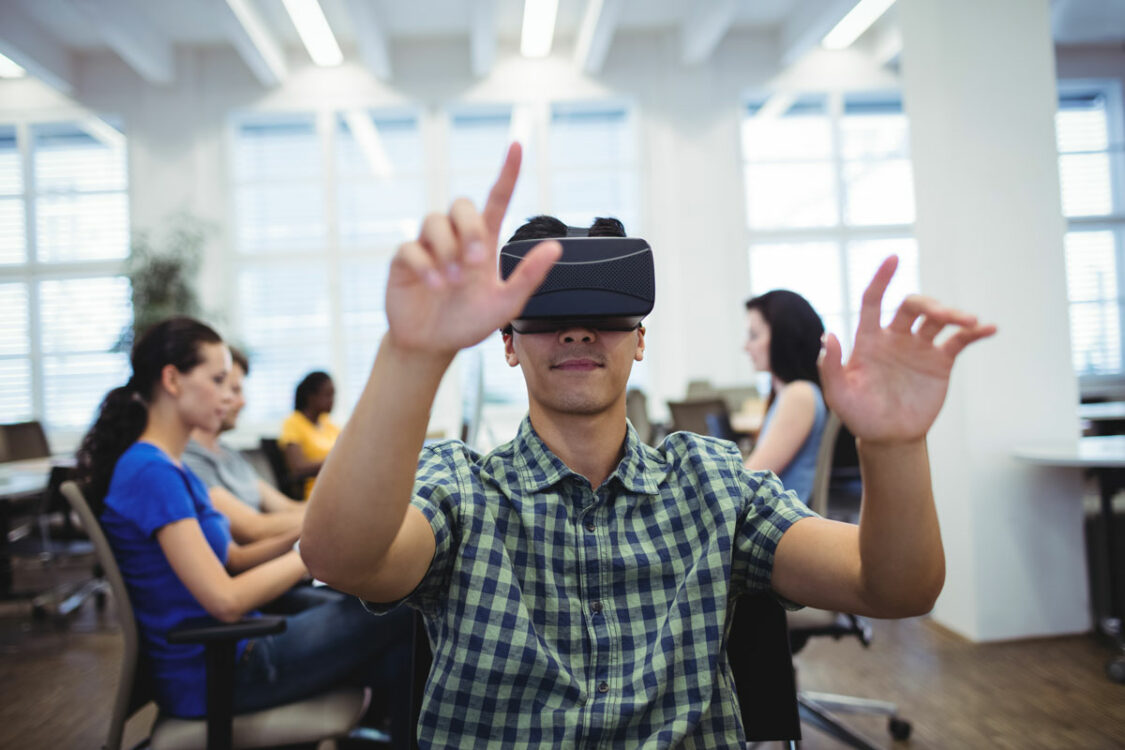Immersive Learning: The Next Frontier Of E-Learning
November 23, 2023
Many of us were introduced to the concept of Virtual Reality through fictional novels or cinema in the late 80’s and 90’s. These forms of literature would transport us into a reality where Immersive Technology was a part of society, exciting many with the thought of future capabilities. Fast forward to 2023 and Virtual Reality (VR), Augmented Reality (AR) and Mixed Reality (MR) are transforming industries like entertainment, architecture, defence, aviation, automotive, retail, healthcare and education.
The aviation and defence industry have been using computer-based simulation training for almost 100 years and therefore adopting immersive learning was a natural progression, but how is immersive learning technology impacting other industries?
Consumer goods, retailers and their supply chains
Businesses are constantly looking for new and innovative ways to interact with their current and potential customers. Major retail brands like Nike, Ikea, Adidas, Loreal, Lancôme and many other household names have launched interactive AR mobile apps that let you visualise their products before deciding to make a purchase.
In 2018 Walmart launched a VR training program for its workforce focusing on soft skills like empathy and customer service. Coles Australia introduced similar training for their distribution centre to educate their team on safe traffic management.
Automotive Manufacturers
Many automotive companies have also started to incorporate VR driving simulations that allow customers to get a feel for the driving experience virtually. This implementation of VR creates sales for new vehicles, builds customer loyalty and saves costs on physical test drives. Automotive industries are also moving towards Mixed Reality vehicles that operate and navigate through voice and gestures as opposed to steering wheels.
AR has also been adopted by Mercedes and Volkswagen to create a futuristic instruction manual that highlights features and servicing tips for both servicing staff and customers.
Building and Construction Industry
Simulation-based training is becoming more common in learning, seeing adoption within the building, energy, construction, and manufacturing industries. By using interactive realities, the industry has been able to generate unique experiences for their customers and staff. Many construction businesses are beginning to employ VR simulators for machine operation and hazard risk training. These learning programs allow staff to navigate through the realistic examples of the hazards they face in the workplace.
The National Electrician Contractors Association in Australia created a unique AR tool that acted as a training companion for their electricians when installing IoT systems. This approach is growing in popularity as they employ modern and interactive ways to learn about new equipment and processes.
Health Industry
The Health Industry is also finding major benefits by employing immersive training to reduce risks, better equip their workforce and provide better patient outcomes. By utilising this technology, medical professionals can maintain the highest standards by exposing themselves to treatments they may not encounter in their day-to-day practice. The Lucile Packard Children’s Hospital in Stanford have improved their overall service by implementing three successful immersive projects that use 3D imaging to better assess patients before they are treated. Amongst many other top universities, the University of Melbourne has begun researching the effectiveness of using VR to train surgery students, giving a risk-free approach to developing their skills. Early studies out of American universities are finding that surgical students perform higher when VR training is incorporated into their practical learning.
How to get started
As more organisations across various industries continue to adopt immersive learning technology, we are seeing a positive trend where the cost of entry is significantly lower. Successful implementations across the industry are leading to more robust planning and reduced implementation costs.
The key to implementing immersive learning programs that are cost-effective and adaptable is rigorous planning and implementation on a data-driven LMS. The ClearXP learning experience platform is currently being used by large Australian retail businesses to implement immersive learning capabilities in their workforce. If you would like to see what they are doing and start planning your own immersive learning program, then let us know.